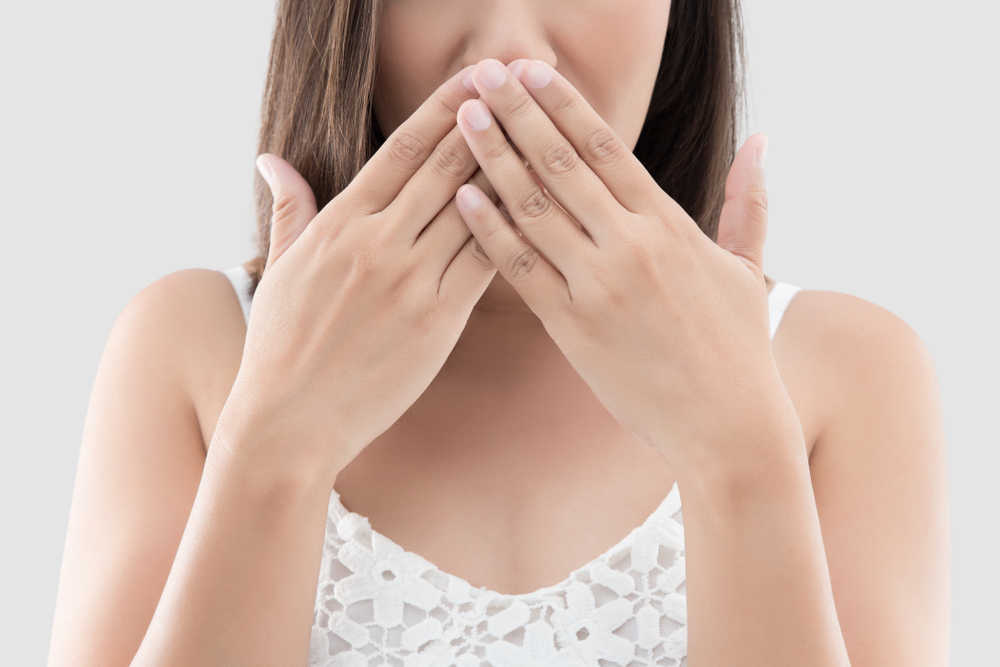 Halitosis, a term used for bad breath, has a prevalence rate of up to 50 percent, reports the University of British Columbia. This condition can be embarrassing and sometimes can even cause anxiety. However, not many individuals visit a dentist for treatments for bad breath. Instead, they try store-bought options such as mouthwashes, mints, gum and other bad-breath-fighting products. Unfortunately, since many of these products don’t do much to address the underlying issue, they’re only temporary solutions.
The first step to tackling the problem is to learn what causes bad breath and some of the reasons you might be experiencing it.
Halitosis, a term used for bad breath, has a prevalence rate of up to 50 percent, reports the University of British Columbia. This condition can be embarrassing and sometimes can even cause anxiety. However, not many individuals visit a dentist for treatments for bad breath. Instead, they try store-bought options such as mouthwashes, mints, gum and other bad-breath-fighting products. Unfortunately, since many of these products don’t do much to address the underlying issue, they’re only temporary solutions.
The first step to tackling the problem is to learn what causes bad breath and some of the reasons you might be experiencing it.
Table of Contents
Causes of Bad Breath
You have millions of bacteria living in your mouth, on your tongue, below your gum line or in pockets gum disease creates between your teeth and gums. These can develop sulphurous smells for various reasons:- Lack of Good Oral Hygiene: When you don’t brush or floss your teeth on a regular basis, the remaining food particles in your mouth and between your teeth can rot and cause foul odours. This can also lead to a buildup of plaque, which can cause odours, too. Once the plaque hardens, it forms tartar (calculus), and it holds bacteria that irritate your gums and can result in gum disease. Gingivitis represents a mild form of gum disease, but when left untreated, gingivitis usually advances to periodontitis.
- Infections or Gum Disease: Gum disease (gingivitis or periodontal disease), tooth decay or mouth sores can lead to bad breath. An infection in the mouth can produce a metallic-smelling odour, and having bad breath could also be an early symptom of gum disease. If gum disease is left untreated, it can eventually affect your jawbone and gums, leading to a receding gum line and tooth loss.
- Food: Food particles break down in your mouth around and in between your teeth, increasing bacteria and causing a foul odour. You can cause bad breath by eating certain foods, like garlic, onions and spices. After digesting these foods, they enter your bloodstream and are then carried into your lungs, affecting your breath.
- Tobacco Products: Smoking causes undesirable mouth odour. It also can dry out your mouth and alter its lining, according to the University of Alberta Bad Breath Clinic. The Ontario Dental Association reports oral tobacco users and smokers are also at a greater risk of gum disease — another cause of bad breath.
- Dry Mouth: Your saliva removes odour-causing particles and cleanses your mouth. A dry mouth, or xerostomia, contributes to bad breath since it reduces saliva production. While sleeping, dry mouth occurs naturally and leads to “morning breath.” If you tend to sleep with your mouth open, it can worsen your dry mouth. Certain diseases and salivary gland problems can lead to chronic dry mouth as well.
- Medications: Certain medicines can produce bad breath indirectly because they contribute to dry mouth. Tricyclic anti-depressants and antibiotics, for example, fall into this class, according to the University of Alberta Bad Breath Clinic.
- Braces or Dentures: If you don’t clean food particles from your braces or dentures properly, they can rot, causing odour and bacteria. Also, if you wear loose-fitting dentures, they can cause infections or sores in your mouth that can result in bad breath.
- Surgery: If you’ve had oral surgery, like a tooth extraction, the surgical wounds can cause bad breath.
- Allergies: A common allergy symptom, post-nasal drip, can cause bad breath. Additionally, sinus congestion from allergies often causes individuals to breathe from the mouth. In turn, this can result in experiencing a dry mouth.
- Mouth, Nose and Throat Ailments: Some individuals develop small bacteria-covered stones on their tonsils that produce an odour. Chronic inflammation or infections in your sinuses, throat or nose contributing to postnasal drip can cause bad breath as well. In young children, they might have bad breath because of a foreign body, such as a food particle, is lodged up in a nostril, for example.
- Other Health Conditions: Metabolic disorders and diseases like cancer and diabetes can cause a distinct breath odour due to the chemicals they produce. For example, having uncontrolled diabetes or diabetic ketoacidosis can lead to fruity-smelling or acetone-smelling breath, respectively. Having gastroesophageal reflux disease (GERD) or a hiatal hernia can lead to bad breath due to refluxing of stomach acids. A person with kidney disease or kidney failure can have breath that smells like ammonia.
Bad Breath Symptoms
The type and unpleasantness of bad breath odours can vary and depend on the underlying cause. Some individuals worry all the time about having bad breath when they have little-to-no mouth odour. Others have persistent bad breath and don’t realize it unless someone speaks up and informs them. Often, people will notice if another person has halitosis before that individual realizes it. The main symptom of halitosis is an unpleasant odour coming from the mouth. Other symptoms and signs of bad breath include:- A coating on the tongue
- Sour or unpleasant taste
- Dry mouth
- Changes in taste
Prevention and Treatment of Bad Breath
Proper oral care can help preserve your teeth, improve your oral health and prevent bad breath. You have several halitosis treatment options, which depend on the underlying cause. These tips to prevent bad breath include:- Avoiding Smoking or Chewing Tobacco: These can lead to dry mouth and bad breath. They’re also bad for your health. Your dentist may be able to recommend tips or medications for smoking cessation.
- Cleaning Your Tongue: Your tongue coating is the primary origin of physiological halitosis. The coating on the tongue comprises blood cells, desquamated or peeling epithelial cells and bacteria. Over 100 bacteria could be attached to one epithelial cell on your tongue, so cleaning your tongue might help eliminate or reduce bad breath in some cases. The Canadian Dental Association (CDA) recommends against using an adult toothbrush or tongue scraper for cleaning your tongue since these instruments could actually injure it. A small tongue brush or infant toothbrush are adequate.
- Keeping Your Mouth Moist: Drink water and chew on sugar-free candy or sugarless gum to keep your mouth moist and stimulate saliva production. Remember, mouthwash only masks bad breath temporarily — it’s not one of the cures for bad breath.
- Brushing Your Teeth a Minimum of Twice Daily: Be sure to brush your teeth at least twice daily and floss at least once per day. By not cleaning your mouth, remaining food particles could end up attracting the bacteria, contributing to tooth decay and causing bad breath.
- Steering Clear of Certain Foods: Foods like onions, certain spices and garlic can contribute to bad breath. If you don’t want to avoid these foods, you may want to try using mouthwash after eating them to help with the lingering mouth odour they cause.
- Avoiding and Treating Dry Mouth: Dry mouth results in bad breath. Saliva cleanses your mouth, removes odour-causing food particles and inhibits bacteria growth. Taking certain medications, consuming alcohol and breathing through your mouth can all cause dry mouth. Chew sugar-free gum or drink water to keep your mouth moist. If you’re struggling with xerostomia (dry mouth) and that’s causing your bad breath, your dentist may be able to prescribe you artificial saliva.
- Getting Other Underlying Medical Conditions Treated: You’ll require medical attention to treat underlying health conditions that cause bad breath. Diabetes, sinus infections, acid reflux or GERD are potential underlying health concerns.
- Trying Natural Remedies: You can also try natural remedies when attempting to figure out how to treat bad breath. Chewing on parsley or mint are good examples.
- Changing Medications: If your halitosis is a side effect of a particular medication you’re taking, talk with your doctor and see if they can prescribe you a different medication. Don’t stop taking your medication without first consulting with your doctor.
- Visiting Your Dentist: If you have chronic bad breath and home remedies haven’t helped, consider booking an appointment with your dentist.
Getting Dental Disease Treated
Gum disease may cause your gums to recede or pull away from your teeth, leaving deep pockets filled with odour-causing bacteria. In some cases, only professional cleaning can remove these bacteria. If you have advanced gum disease and need surgery or additional treatments, your dentist may refer you to a periodontist. If you have gingivitis, the dentist might give you a prescription for antibiotics to fight the infection. Your dentist might also suggest using an antibacterial toothpaste that can reduce gingivitis and plaque when you use it regularly. If you have periodontitis, the dentist or hygienist may perform a technique known as root planing and scaling to clean your teeth and remove tartar and plaque buildup from below and above your gum line. This procedure can also help to reduce or eliminate bad breath coming from plaque buildup below the gum line. Additionally, the dentist may need to replace a faulty tooth restoration which can also attract bacteria. You might require oral surgery if these treatments don’t address the problem or if you are suffering from severe gum or teeth damage. Some options for surgery may include:- A flap procedure for cleaning tooth roots and repairing bone damage
- Gingivectomy to eliminate pockets between your gums and teeth where there’s a buildup of plaque
- Extraction of damaged or loose teeth
- Swollen, red or tender gums
- Bleeding gums after brushing or flossing
- Separating or loose teeth
- Bleeding gums after eating hard foods
- Any changes in bite
- Any changes in the fit of partial dentures
- Receding gums or gums that pull away from your teeth
- Chronic bad breath
- Pus between your gums and teeth when you press on your gums
- Sores in the mouth
- Persistent dry mouth
- Dental pain or broken teeth
- Difficulty or pain with swallowing or chewing
- Fatigue or fever
- White spots on the tonsils








